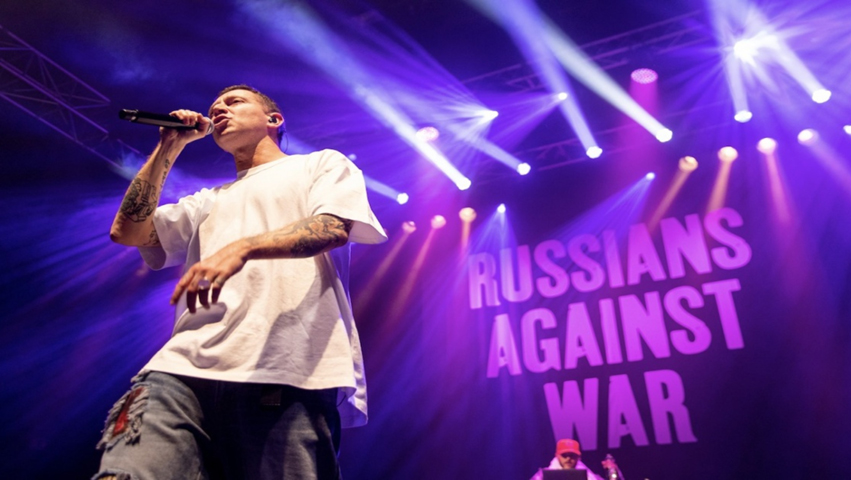The start of Russia’s full-scale military incursion of Ukraine on February 24, 2022, marked a sea change for both nations’ music industries. Russia is the 16th largest music market in the world, according to the 2020 IFPI Global Music Report, and several music corporations have stopped their services and operations in Russia since the invasion.
Historically, music played a significant role in influencing the politics and society of Soviet Russia. During the Cold War, music was essential in expressing dissent and attaining independence for Estonia, Latvia, and Lithuania through the Singing Revolution from the Soviet Union. The Balts conducted music concerts during political rallies to oppose the Russification of the Soviet authoritarian regime. The Soviet people recognised songs as a sign of solidarity and a nonviolent way of expressing dissent. This stunning outcome demonstrated that nonviolent action through music may achieve economic and political self-determination rights. People became more enthusiastic as they learnt folk tunes that allowed them to express their freedom of expression and patriotism, ultimately leading to the disintegration in 1991 and forcing the Soviet Union to recognise the independence of new republics.
The current war between Russia and Ukraine follows a similar feat by the revolt of the Russian musicians in expressing their disapproval of the Russian Federation’s conduct. Many cancelled their shows and concerts in protest of the Russian invasion of Ukraine. Following harsh criticism from their government, they were placed on the “blacklist” and are currently prohibited from conducting concerts. Rock group Lumen made it clear to the public that they were not just performing for entertainment but to connect with other anti-war individuals. They soon declared that the proceeds from their anti-war charity performances would aid Ukrainian refugees.
Renowned Russian artist Oxxxymiron brazenly expressed his views with a video message that read, “There are tens of millions of Russians who categorically disagree with this war, and that should be said as loudly as possible”. While his second event in London on March 24 raised £38,000 for Ukrainian refugees, his first concert in Istanbul on March 15 raised £22,000.
In protest, several well-known rappers like Face and Morgenstern have left Russia, stating their permanent non-arrival and pleading with Ukrainians for forgiveness. Simultaneously, the scene in Belarus displayed folk melodies that became opposition anthems and were performed defiantly by professional musicians from Belarus’ National Philharmonic as a form of protest.
Ukraine has been able to voice its opposition to Russia through the Eurovision Song Contest, a yearly event occurring since 1956 to bring post-war Europe together. Their triumph occurred in 2016 when the song “1944 “was performed based on the deportation of Crimean Tatars that touched on war victims and ultimately served as a manifesto for combating injustice. Jerry Heil and Alyona Alyona, two Ukrainian singers who competed in this year’s competition in 2024, utilised this opportunity to draw attention to the ongoing war as the public’s interest in it had been waning.
Renowned financial services, such as PayPal, Visa, and Master Cards, are not operating in the Russian music industry. In contrast, Spotify and Apple Music, the music streaming services, have halted their operations in Russia, making it more difficult for Russian musicians to make money. The three major record labels that control around 70% of the world’s music market—Warner, Universal, and Sony—have suspended operations in Russia.
Popular music companies, including Sound Exchange, Kobalt (publishing company), Fuga (music distribution and marketing company), Downtown (international music company), Livenation (largest concert promoter in the world), Oak View Group (international development and entertainment company), and Absolute label services (which provides content to Russia’s streaming platforms, VKontakte and Yandex) ceased operations in Russia due to its military aggression. While YouTube restricted the channels of several Russian musicians and artists that supported the conflict, TikTok paused its services and offered a view-only option for earlier videos in Russia.
Thus, it is clear that music has contributed to Ukrainians’ ability to stay positive. Singers from Belarus and Russia united to assist Ukraine by refusing to support their own country, and their concerts helped raise money for the peace movement. Young people in Russia and Ukraine adopted traditional folk songs and musical instruments to protest the war, demonstrating that music can serve as a powerful force for justice and nonviolent action that can reach more tremendous bounds.







